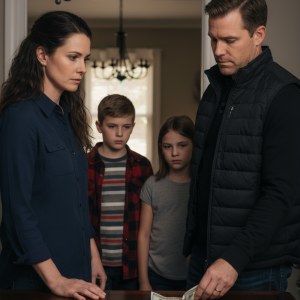The morning began like every other in our sleepy town’s market—barcode beeps, soft chatter, and the comforting scent of fresh bread drifting down Aisle 3. I’d been behind that familiar register for years, hands moving on muscle memory, greeting regulars by name. Nothing hinted that the calm would be shattered by a storm in designer heels.
Then she swept through the entrance—tailored coat, impeccable hair, and fury sharp enough to slice fruit. Dragging a wide‑eyed boy, she zeroed in on me, voice rising over the aisle music. “Where are the organic Honeycrisps?” she barked, as though the apples’ disappearance were a personal betrayal. Each clipped word slapped the hush out of the store, but I clung to practiced politeness, answering questions she barely let me finish.
Complaint lodged and ego seemingly vindicated, she spun on her stilettoed heel to parade out. Only the universe had other plans. The automatic doors—perfectly obedient seconds earlier—froze in place. She collided nose‑first with the glass, the echoing thunk silencing every rustling shopping bag. Shoppers froze mid‑step, breaths held, eyes wide.
As she staggered back, cheeks matching the crimson sale signs, a small tug on her sleeve anchored her. “Mom,” the boy murmured, his voice soft as tissue paper, “you were mean to that lady. Maybe say sorry?” In that sudden stillness, his words rang louder than any public announcement—innocence exposing what pride tried to hide.
For a beat, I thought her shoulders might drop, contrition loosening her tongue. Instead, she mumbled something neither apology nor explanation, tightened her grip on the boy’s hand, and marched out—this time the doors parting without protest, as if bowing in ironic farewell. My manager’s quiet pat on my shoulder broke the spell. “Grace under pressure,” he whispered. But in my mind, the true grace belonged to a child whose courage was gentler—and louder—than his mother’s anger.





